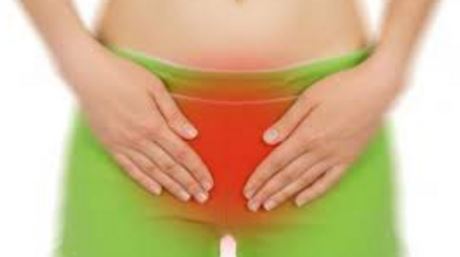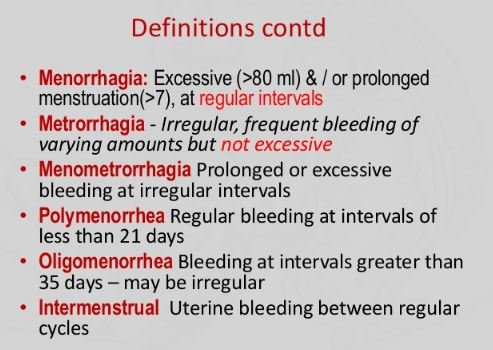Metrorrhagia
What Is Spotting After Menses Or Menstruation?
Metrorrhagia is the medical term for vaginal bleeding during menstruation, spotting after menses and irregular bleeding menses which can be caused by different factors and may lead to complications if it is not addressed immediately. [1][2][3]


The spots or spotting occur in minimal amounts and is difficult to detect because it can either go with your regular menses or it can either be noted days after the last day of menstrual period.
What Causes Spotting After Menses?
There are possible reasons and contributing factors that can cause metrorrhagia: [3][4]
- Hormonal Imbalances – Increase or decrease level of estrogen and progesterone can alter the secretion of menses and can cause spotting episodes.
- Fibroids – Tissues that are fibrous that can either be left when the woman has experienced complications during childbirth or incomplete abortion procedures. Take note: Fibroids are not cancerous.
- Erosion of cervix – Damage or injury in the lining of the cervix.
- Endometriosis – Infection in the endometrial muscle can cause injury and damage that will lead to bleeding tendencies.
- Miscarriages – Records of abortions or miscarriages can cause sepsis and injury in the lining of the uterus.
- Contraceptives – Oral contraceptives inhibits either the production of estrogen or progesterone. The increase or decrease amount of these in the body can alter the hormones. IUDs can also cause complications especially when it is dislodged.
- Medications and drugs – Some medications can cause hormonal imbalances, increase bleeding tendencies and can also cause thinning in the uterine lining.
- Stress – Increase in the level of stress and anxiety can alter the menstrual cycle and the production of hormones.
- Polyps – Mucusal membranes inside the uterus can lead to blockage or alteration in the circulation. It can either cause the pressure and increase bleeding or it can either cause infections leading to sepsis and hemorrhages. Take note: Polyps are not cancerous.
- Adhesions (scar tissue) inside the uterus
- Sex – Traumatic sex and sexual abuse can increase the potential of the individual to have spotting after menses because it can either be from injury in the lining or a sexual diseases or infection.
- Other medical disorders – Chronic medical problems can be one of the cause in the alterations in the bleeding after menses. Diseases or disorders such as Diabetes Mellitus, Thyroid problems, and Cancer.
Who Are At Risk For Developing Spotting After Menses?
Women are prone to having this condition because they are the one who undergo the menstrual cycle. Girls who have their first menses (menarche) and women who already have their cessation of menses (menopause) are prone to having this disorder. [3]
What Are The Signs And Symptoms When You Have Spotting After Menses?
Manifesting the following signs and symptoms should not be taken for granted, rather to be monitored. The patient may experience the following:
- Minimal amount of blood after menses
- Bleeding tendencies during or after menses
- Abdominal pain
- Fever
- Sepsis
- Inflammation of the uterine lining
Are There Any Complications, When You Have Spotting After Menses?
If metrorrhagia is not immediately addressed, the patient may experience complications.
- Hemorrhage or loss of excessive amount of blood.
- IDA or Iron Deficiency Anemia
- Mood swings
- Endometriosis
- Fibroids
- Sepsis
- Embolism
- Hypotension
- Shock
How Can Spotting After Menses Be Detected?
Metrorrhagia can be detected through conduct of series of tests and studies. [3]
Laboratory Tests and Studies
- Human chorionic gonadotropin (HCG)
- Complete blood count (CBC)
- Papanicolaou Test (Pap smear)
- Endometrial sampling
- Thyroid functions and prolactin
- Liver functions
- Coagulation studies/factors
Imaging Tests and Studies
Ultrasonography – The test that provides a ultrasound scan of the uterus.
Endometrial Biopsy – A small amount of muscle in the endometrium is being acquired by the health provider to see if there is possible cancerous agent causing the spotting
Sonohysterogram -It is an ultrasound scan which is done after fluid is injected (the medium) through a tube into your uterus. This imaging study aids in seeing the any possible alterations in the lining of the uterus.
Hysteroscopy – A small tin metal is being inserted via the vagina to see or visualize any possible blockage on the uterine area and other reproductive organs.
Hysterosalpingography – A dye is being injected into the uterus and fallopian tubes via the cervix. Like the sonohysterogram, it also shows the uterine lining.
Do I Need To See A Doctor, Just In Case There Is A Spot When I Have My Menses?
If the bleeding does not stop for several days after your menstruation, there is a need to see a doctor because it may either be related to other illnesses or disorders. It is better to consult and seek professional medical practitioners to secure your safety and fast recovery from any other disorders. [3][4]
What Are The Other Treatments And Managements For Spotting After Menses?
Spotting after menses can either be addressed in chemotherapy or surgical procedures, depending on its severity and possible complications: [6]
Medicines and drugs:
- Oral contraceptive pills – to prevent and fix the hormonal imbalances
- Progesterone only pills – to balance the amount of progesterone inside the body.
- Injected progestogens
- Depo provera
- Anti-inflammatory medication
- Tranexamic acid
- Norethisterone
- Gonadotrophin-releasing hormone agonists
- Goserelin
Surgical and operation procedures:
- Dilatation and curettage (D & C)
- Endometrial ablation
- Uterine artery embolisation
- Hysteroscopic myomectomy – Removal of the muscles of the uterus through using scopes.
- Hysterectomy – The removal of the uterus (in severe cases).
Can I Prevent Or Stop My Menses From Spotting After My Menses?
Metrorrhagia is a condition either anatomically or physiology. It can also prevent if you are able to detect it earlier and be able to do the following: [1]
- Healthy Diet – eating the right amount of food and nutritious food can help prevent particular disorders or factors that can aggravate the condition of the mere existence of it.
- Healthy Lifestyle – Doing enough exercise and doing activities of daily living (ADLs) not only aids in boosting the immune system, but also prevents an individual from acquiring any illnesses and disorders.
- Normal weight and BMI – Obesity can be one factor of having spotting in menses, that is why it is better to maintain the normal weight gain and prevent other complication.
References:
- http://www.healthline.com/health/vaginal-bleeding-between-periods#Overview1
- http://www.corephysicians.org/news-and-health-library/health-library/women-health/wome5209/
- http://www.whattoexpect.com/preconception/metrorrhagia
- http://www.mayoclinic.org/symptoms/vaginal-bleeding/basics/definition/sym-20050756
- https://www.nlm.nih.gov/medlineplus/ency/article/000903.htm
- http://www.rightdiagnosis.com/m/metrorrhagia/intro.htm
